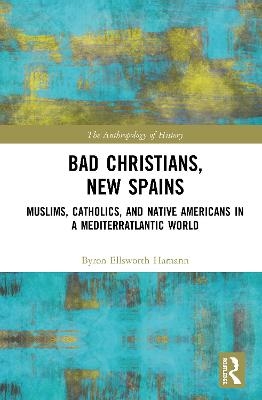
Bad Christians, New Spains
Muslims, Catholics, and Native Americans in a Mediterratlantic World
Seiten
2019
Routledge (Verlag)
978-0-367-22112-6 (ISBN)
Routledge (Verlag)
978-0-367-22112-6 (ISBN)
This book centers on two inquisitorial investigations. One involved relations of Europeans and Native Americans in an Oaxacan town (in New Spain). The other involved relations of Moriscos (recent Muslim converts to Catholicism) and Old Christians (people with deep Catholic ancestries) in Mediterranean kingdom of Valencia (in old Spain).
This book centers on two inquisitorial investigations, both of which began in the 1540s. One involved relations of Europeans and Native Americans in the Oaxacan town of Yanhuitlán (in New Spain, today’s Mexico). The other involved relations of Moriscos (recent Muslim converts to Catholicism) and Old Christians (people with deep Catholic ancestries) in the Mediterranean kingdom of Valencia (in the "old" Spain).
Although separated by an ocean, the social worlds preserved in these inquisitorial files share many things. By bringing the two inquisitions together, Hamann reveals how very local practices and debates had long-distance parallels, parallels that reveal larger entanglements of the early modern world. Through a dialogue of two microhistories, he presents a macrohistory of large-scale social transformation. We see how attempts in both places to turn old worlds into new ones were centered on struggles over materiality and temporality. By paying close attention to theories (and practices) of reduction and conversion, Hamann suggests we can move beyond anachronistic models of social change as colonization, and place early modern concepts of time and history at the center of our understandings of the sixteenth-century past.
Overall, this project intervenes in major debates from both history and anthropology: about the writing of global histories, our conceptualizations of the colonial, the nature of religious and cultural change, and the roles of material things in social life and the imagination of time.
This book centers on two inquisitorial investigations, both of which began in the 1540s. One involved relations of Europeans and Native Americans in the Oaxacan town of Yanhuitlán (in New Spain, today’s Mexico). The other involved relations of Moriscos (recent Muslim converts to Catholicism) and Old Christians (people with deep Catholic ancestries) in the Mediterranean kingdom of Valencia (in the "old" Spain).
Although separated by an ocean, the social worlds preserved in these inquisitorial files share many things. By bringing the two inquisitions together, Hamann reveals how very local practices and debates had long-distance parallels, parallels that reveal larger entanglements of the early modern world. Through a dialogue of two microhistories, he presents a macrohistory of large-scale social transformation. We see how attempts in both places to turn old worlds into new ones were centered on struggles over materiality and temporality. By paying close attention to theories (and practices) of reduction and conversion, Hamann suggests we can move beyond anachronistic models of social change as colonization, and place early modern concepts of time and history at the center of our understandings of the sixteenth-century past.
Overall, this project intervenes in major debates from both history and anthropology: about the writing of global histories, our conceptualizations of the colonial, the nature of religious and cultural change, and the roles of material things in social life and the imagination of time.
Byron Ellsworth Hamann is Hanna Kiel Fellow at I Tatti, The Harvard University Center for Italian Renaissance Studies, Florence, Italy.
Introduction 1.Ashes and Silkworms 2.Geographies of Discord 3. Catholic Catholicisms 4. The Poverty of Economy 5. Ruination 6. The Excavation of the Dead 7. Chronologies at War Conclusion: Conversion, reduction, and early modern empire Epilogue
| Erscheinungsdatum | 05.12.2019 |
|---|---|
| Reihe/Serie | The Anthropology of History |
| Zusatzinfo | 1 Tables, black and white; 57 Halftones, black and white; 57 Illustrations, black and white |
| Verlagsort | London |
| Sprache | englisch |
| Maße | 156 x 234 mm |
| Gewicht | 825 g |
| Themenwelt | Geschichte ► Allgemeine Geschichte ► Neuzeit (bis 1918) |
| Geisteswissenschaften ► Geschichte ► Regional- / Ländergeschichte | |
| Sozialwissenschaften ► Ethnologie | |
| Sozialwissenschaften ► Soziologie ► Spezielle Soziologien | |
| ISBN-10 | 0-367-22112-8 / 0367221128 |
| ISBN-13 | 978-0-367-22112-6 / 9780367221126 |
| Zustand | Neuware |
| Haben Sie eine Frage zum Produkt? |
Mehr entdecken
aus dem Bereich
aus dem Bereich
Europa 1848/49 und der Kampf für eine neue Welt
Buch | Hardcover (2023)
DVA (Verlag)
48,00 €
Giordano Bruno - ein ketzerisches Leben
Buch | Hardcover (2024)
C.H.Beck (Verlag)
29,90 €


